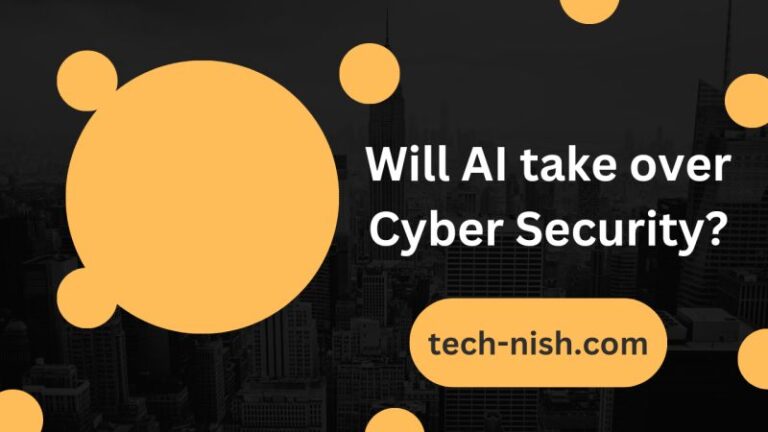Will AI take over cyber security?
In a world marked by rapid technological advancements and an ever-increasing digital presence, robust cybersecurity has never been more important. As the digital footprint of businesses and individuals grows, a lot of people are turning to artificial intelligence (AI) as a powerful tool to improve their defenses. This article delves deeper into the intricate relationship between AI and cybersecurity to answer the crucial question on everyone’s mind: Is it possible that cybersecurity will eventually be replaced by AI?
Cybersecurity and AI: An imposing arsenal
In the never-ending battle against cyber threats, artificial intelligence (AI) has emerged as a formidable ally. Risk identification and response procedures have been reformed as a result of their capacity to rapidly process and dissect enormous amounts of information on a consistent basis. Tools that are powered by artificial intelligence have the amazing ability to sort through terabytes of data quickly and more effectively than any human examiner could, spotting potential risks and weaknesses.
A significant advantage of AI in cybersecurity is automation. The examination of framework logs and organization traffic observation are two instances of routine and regularly tedious assignments that can now be appointed flawlessly to computer-based intelligence-controlled frameworks. This automation reduces the likelihood of security breaches going unnoticed, which improves operational efficiency and ensures that potential threats are addressed promptly.
Table of Contents
The Human Touch: An Irreplaceable Element
Notwithstanding, in spite of the relative multitude of advances and developments that artificial intelligence has made in network protection, it is as yet fundamental to perceive that computer-based intelligence can’t totally supplant human mastery in this field. The field of online security is complex and requires a thorough understanding of technology, human behavior, and the ever-changing threat landscape. Despite the fact that AI algorithms are undeniably impressive, they lack the inherent human qualities of critical thinking, context awareness, intuition, and creative problem-solving that human analysts bring to the table.
Professionals in human cybersecurity play more roles than just responding to threats. They are the architects of security strategies and are in charge of proactive protection of networks and systems against potential vulnerabilities. They also serve as a moral compass, ensuring that cybersecurity practices adhere to legal and ethical standards.
Humans and AI Working Together:
A harmonious partnership between humans and AI appears to be the defining feature of the cybersecurity industry’s future. When it comes to choosing the best course of action, AI, with its capacity to process vast amounts of data and identify potential threats, complements human judgment. By working together, we can make sure that the strengths of AI and human expertise are combined to create a strong cyber defense.
For instance, AI excels at continuously analyzing the patterns of network traffic and identifying anomalies that could point to a breach. Be that as it may, human examiners research these inconsistencies, think about the more extensive setting, and settle on choices in view of the expected effect of the circumstance. This powerful interchange among man-made intelligence and people fills in as the bedrock of a strong network protection technique.
In the cybersecurity arsenal, AI will undoubtedly become an even more potent tool as it continues to advance. Both the detection of threats and the proactive mitigation of those threats, before they can cause significant damage, will be made easier with the help of predictive analytics and machine learning models. Organizations can move from reactive to proactive cybersecurity strategies with the assistance of AI.
Ethical Considerations in AI-Powered Cybersecurity
While integrating AI into cybersecurity brings immense promise, it simultaneously raises ethical concerns that demand attention. These include:
- AI Algorithms with Bias: Computer-based intelligence frameworks can acquire inclinations from the information on which they are prepared. This could result in the unfair targeting or mischaracterization of particular individuals or groups in the field of cybersecurity.
- Transparency: For accountability, it’s essential to know how AI systems make decisions. Maintaining confidence in cybersecurity practices necessitates transparent AI systems.
- AI misuse: Strong cybersecurity measures and ethical guidelines are required due to the possibility of malicious use of AI-powered tools.
- Privacy of data: Concerns about the security and privacy of data emerge as AI systems require a lot of data for training. Upholding trust in AI-driven cybersecurity solutions necessitates the protection of sensitive data.
If we want AI to be used ethically and fairly in cybersecurity practices, we must address these ethical concerns. It requires a mix of specialized arrangements, industry principles, and administrative oversight.

How AI Is Different from Other Approaches to Cybersecurity:
AI-based solutions differ from other approaches to cybersecurity in a number of ways.
As was just mentioned, signature-based detection systems were only effective against known threats in traditional cybersecurity approaches. As a result, new and unidentified threats could go unnoticed.
In contrast, AI-based solutions make use of machine learning algorithms that are able to instantly identify and respond to threats, both known and unknown.
Data from the network and endpoints, as well as historical threat data, are used to train machine learning algorithms to recognize patterns that are difficult for humans to see. Without the need for human intervention, AI-based solutions are able to recognize threats and respond immediately.
For instance, AI calculations can dissect network traffic examples to distinguish irregular way of behaving that might demonstrate a cyberattack, and afterward ready security faculty or even make a computerized move to relieve the danger.
The fact that AI-based solutions are made to constantly learn and change is another way that they differ from conventional methods.
Machine learning algorithms can be trained on new data as new threats emerge to improve their ability to detect and respond to them. As a result, AI-based solutions are able to adapt to the changing threat landscape and enhance cybersecurity protection over time.
The way businesses approach cybersecurity has fundamentally changed as a result of the incorporation of AI into the field. Simulated intelligence-based arrangements can give more compelling security against both known and obscure dangers – utilizing AI calculations to distinguish and answer dangers continuously. This aids businesses in better safeguarding critical systems and sensitive data.
Conclusion: The Synergy of AI and Humans
In conclusion, cybersecurity is not entirely being replaced by AI; rather, it has the potential to improve it. By enhancing human capabilities, AI improves cybersecurity’s efficiency and efficacy in a time when the digital landscape is constantly changing. A symbiotic partnership between humans and AI, utilizing each other’s strengths to stay one step ahead of cyber threats, will shape the future of cybersecurity.
To build a strong defense against ever-changing threats, businesses and individuals alike must continue to invest in cybersecurity experts and AI technologies. In an undeniably interconnected and weak world, the way to shield advanced resources and individual data lies in this cooperative human-machine organization. In order to safeguard our digital future, this collaboration will become even more essential as the threat landscape continues to change.

Learn more about Cyber Security, Artificial Intelligence at tech-nish.com
For women, Women In CyberSecurity Middle East is the best platform 